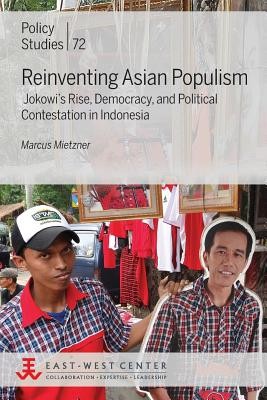
- We will send in 10–14 business days.
- Author: Marcus Mietzner
- Publisher: East-West Center
- ISBN-10: 0866382623
- ISBN-13: 9780866382625
- Format: 15.6 x 23.4 x 0.5 cm, minkšti viršeliai
- Language: English
- SAVE -10% with code: EXTRA
Reviews
Description
The book description text is repeated (2 times, one after the other). Rather than you reading through the description to determine where the repeat starts, please replace the description with the following:
Around the globe, populists have used the decline of established political parties and widespread societal fears of globalization to launch increasingly successful electoral campaigns. Indonesia is no exception. In the 2014 presidential elections, two populists even competed against each other--albeit with vastly different concepts of populism. Prabowo Subianto, the wealthy former son-in-law of ex-autocrat Suharto, offered a classic populist paradigm based on anti-foreign rhetoric, condemnation of the status quo, appeal to the poor, and neo-authoritarian reform plans. By contrast, his opponent, the down-to-earth former carpenter and Jakarta governor, Joko Widodo ("Jokowi"), advanced a new form of technocratic populism that was inclusive, nonconfrontational, and primarily focused on improving the quality of public service delivery. This study explores the dynamics of the electoral contest between Prabowo and Jokowi, and analyzes what they tell us about the conditions under which populist campaigns are launched and succeed or fail. It shows that Prabowo's campaign was ultimately defeated because Indonesia's post-Suharto democracy was not in a state of acute, life-threatening crisis. However, the issue also illuminates Jokowi's struggle to establish his populist rule after his inauguration as president, with oligarchic forces and other members of the old elite forcefully trying to intrude into his new government.
- Author: Marcus Mietzner
- Publisher: East-West Center
- ISBN-10: 0866382623
- ISBN-13: 9780866382625
- Format: 15.6 x 23.4 x 0.5 cm, minkšti viršeliai
- Language: English English
The book description text is repeated (2 times, one after the other). Rather than you reading through the description to determine where the repeat starts, please replace the description with the following:
Around the globe, populists have used the decline of established political parties and widespread societal fears of globalization to launch increasingly successful electoral campaigns. Indonesia is no exception. In the 2014 presidential elections, two populists even competed against each other--albeit with vastly different concepts of populism. Prabowo Subianto, the wealthy former son-in-law of ex-autocrat Suharto, offered a classic populist paradigm based on anti-foreign rhetoric, condemnation of the status quo, appeal to the poor, and neo-authoritarian reform plans. By contrast, his opponent, the down-to-earth former carpenter and Jakarta governor, Joko Widodo ("Jokowi"), advanced a new form of technocratic populism that was inclusive, nonconfrontational, and primarily focused on improving the quality of public service delivery. This study explores the dynamics of the electoral contest between Prabowo and Jokowi, and analyzes what they tell us about the conditions under which populist campaigns are launched and succeed or fail. It shows that Prabowo's campaign was ultimately defeated because Indonesia's post-Suharto democracy was not in a state of acute, life-threatening crisis. However, the issue also illuminates Jokowi's struggle to establish his populist rule after his inauguration as president, with oligarchic forces and other members of the old elite forcefully trying to intrude into his new government.


Reviews